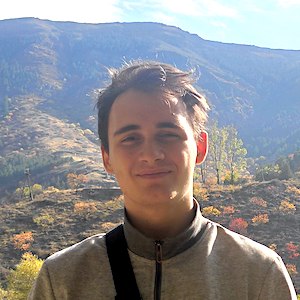Our testimonials: Maksim

Our testimonials: Maksim
Meet Maksim from Belarus
Student of Information Engineering
"It is a university that is very engaged with its students. And I liked its history and its values that celebrate the scientific approach to matters, freedom, equality and the importance of education"

About myself
I'm a 19 years old international student at the University of Padua coming from Minsk, Belarus. My field of interest, for now, is programming and physics. At the same time, I love travelling and doing sports, such as boxing and powerlifting. Before coming to Italy, I was studying in Georgia for two years. There, I gain a strong desire to continue exploring the world and travelling. Now, at the University of Padua, I like and enjoy the atmosphere of freedom the most, both academic and personal. Before I thought I knew what I'd do after university, but here I developed a new dream to continue work in academia as so far it has been a great place for personal growth and learning. As for this moment, I am involved with the university project called UNIZEB which is focused on building a sustainable living house-laboratory. My role there together with the other members of our team is to set up, install sensors and analyze the data. Outside of the university, I used to volunteer for the honorary consulate of Ukraine in Padua in times of need. In my free time, I am focusing on developing my own phone application and travelling around Italy.
Why did you decide to study in Padua and how have you found the experience so far?
I decided to study in Padua because I was taking an Italian language class in my high school. There I learnt a lot about culture. So, when I was looking for a university, I prioritised Italian universities because I realised it would be easier to integrate and study already knowing a bit of language and cultural aspects. The University of Padua seemed especially an interesting option since it is an affordable public university that opened a new bachelor’s degree programme in English that year. The programme was a perfect fit for all my interests and is a good starting point if you are not exactly sure what you want to do in the STEM field after graduation. Then, it is a university that is very engaged with its students. And I liked its history and its values that celebrate the scientific approach to matters, freedom, equality and the importance of education.
I've been living and studying in Padua for a year already, but my experience keeps getting better and better. In the beginning, it was difficult to get used to a new city, to independent student life, and to an academic system. But I got used to these aspects. And now as I discover new opportunities, make new friends and participate in various workshops or projects my experience here becomes more interesting and useful every day.
What are some things people might not know about studying in Italy?
What I came to understand is that a university experience in Italy is not very demanding. In the sense that the university does not put a lot of work on your shoulders while still providing all the information that you will need. At the same time, you can find a lot of extracurricular activities, student-run clubs, organisations, etc. Therefore, you can build your own university experience, do what matters to you most, and dedicate some time to yourself.
The same goes for the exam system. It does not put a lot of stress on the students by giving them multiple chances to pass the class. It gives every person an opportunity to build their own exam schedule considering their personal circumstances.
Tell us a bit about student life in Italy. What do you do for fun and where are your favourite places to spend time?
During the weekend there are actually a lot of things to do. Especially this year, given the 800th anniversary of the university. First, I think it is a great idea to take a look at all the university museums (especially the Physics, and Geography museums) and listen to the Noble lectures.
Since this summer I’ve been enjoying 1-day bicycle tours to nearby cities of Veneto. It is a great and healthy way to relax after a week of studying. Each city is something new in terms of architecture, food, and history. And you could get yourself a nice collection of photos as well.
The international community of Padua is very active as well. The ESN network and other student organisations organise parties, events, or thematic nights almost every week. You won’t have time to visit them all.
Walking in the evening or early at night around the city centre of Padua is a worthy thing to try as well. The sky is often clean and you can see bright stars above breath-taking buildings, like La Specola or just being in Prato della Valle.
Moreover, recently I discovered the agreement between theatres in Padua and ESU that allows students to visit the most interesting operas (mostly in Italian) for a student-friendly price of 3 euros. And it might become my next favourite thing to do while living in Padua.
What is the food like in Padua? What is your favourite Italian dish and why?
Food in Padua is very diverse. You get a lot of amazing Italian restaurants plus many places where you can eat diverse cuisine from all around the world.
My personal best is brioche and coffee in the morning. I believe there is not one international student who has not tried the Italian breakfast. Despite the amount of sugar and calories, if you add a sandwich to it, it is actually a good way to start your day thanks to the amount of energy it gives you.
Have you found it easy to meet new people since starting university? How have you done this?
The university is one of the best places to make new friends and connections. Especially Padua because it is a student city, where a lot of students come from different cities or countries and are striving to meet new people as well. One of the best ways to do it is to join a student organisation or a project. Also, it is important to get to know people from your course as it will make studying more easy and more fun.
What advice would you give to potential students thinking of studying abroad in Italy?
Familiarise yourself with the Italian language. It will allow you to participate in more projects and opportunities. It will give you an opportunity to communicate with more people. It will help you in many life aspects. Especially since the university offers free courses in the Italian language.
Also be ready for a cultural shock regardless of what place in the world you are coming from. Be open-minded and don’t lock yourself in a certain circle of friends, try to meet new and diverse people that will make your university experience better.
What advice would you give to potential students to prepare for the entry test in Information Engineering?
From my memory, the entrance test did not seem very difficult in terms of topics asked for maths and science sections. In reality, after having solved a couple of mock questions, I realised that you have not only to know the topics asked but also to really understand them.
The logic section was the hardest of all for me because I’ve never answered similar types of questions. You have to adopt a special type of reasoning for these questions. That is similar to the reasoning usually used in science. Once you familiarise yourself with the techniques to answer them, it will become relatively easy.
All in all, I would say it is important to practise and try to time yourself on the questions simulating the real-exam environment if you have never done that before.
MEET OUR TESTIMONIALS
Many students shared their experiences at the University of Padua.
Find out their stories!


